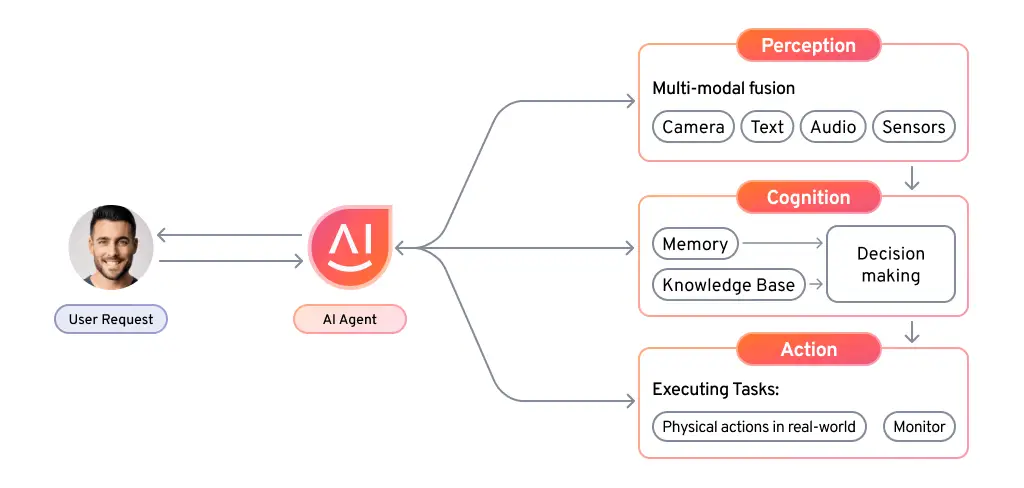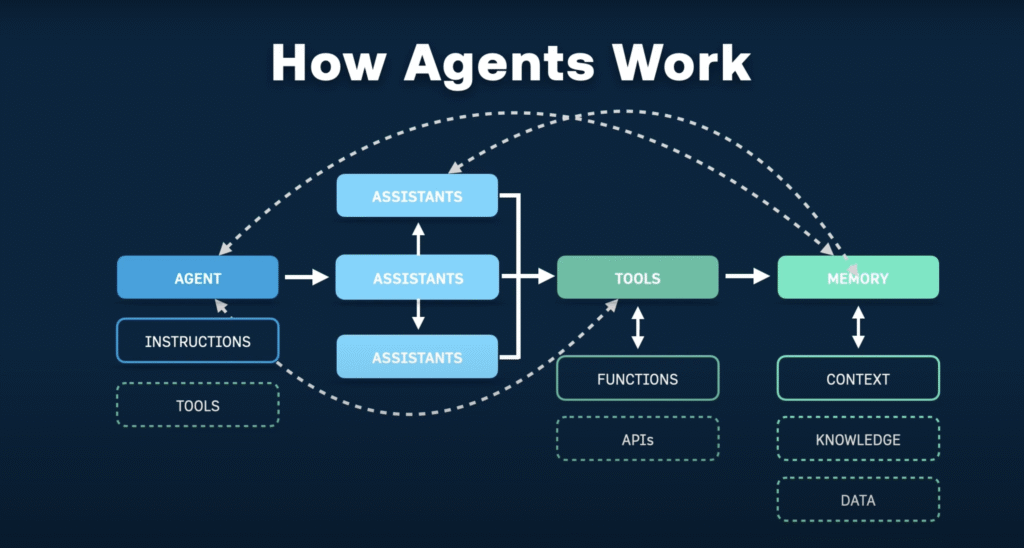
Imagine walking into your office on Monday morning to find that your virtual assistant has already prioritized your emails, scheduled three client meetings based on everyone’s availability, generated a comprehensive report on last week’s sales performance, and identified two potential leads that match your ideal customer profile. This isn’t science fiction—it’s the reality that AI
Imagine walking into your office on Monday morning to find that your virtual assistant has already prioritized your emails, scheduled three client meetings based on everyone's availability, generated a comprehensive report on last week's sales performance, and identified two potential leads that match your ideal customer profile. This isn't science fiction—it's the reality that AI agents are creating for businesses today.
While many companies are still grappling with basic automation tools, forward-thinking organizations are discovering that AI agents represent a fundamental shift in how work gets done. Unlike traditional software that follows rigid rules, AI agents think, learn, and adapt to solve complex business problems with remarkable autonomy.
In this comprehensive guide, we'll demystify AI agents, explore their transformative potential for businesses of all sizes, and provide you with the knowledge you need to determine whether your organization is ready to embrace this game-changing technology. Whether you're a seasoned executive or a curious entrepreneur, understanding AI agents isn't just about staying current with tech trends, it's about positioning your business for the future of work.
At its core, an AI agent is an autonomous software program that can perceive its environment, make decisions, and take actions to achieve specific goals without constant human supervision. Think of it as a digital employee that never sleeps, never gets overwhelmed, and continuously learns from every interaction.
The Fundamental Characteristics
AI agents possess three critical capabilities that distinguish them from traditional software:
Autonomy: Unlike conventional programs that require explicit instructions for every scenario, AI agents can make independent decisions based on their understanding of context and objectives. When faced with unexpected situations, they don't simply break or throw error messages—they analyze, adapt, and respond appropriately.
Goal-Oriented Behavior: AI agents are designed with specific objectives in mind. Whether it's improving customer satisfaction scores, reducing response times, or increasing sales conversions, they continuously work toward these defined goals, adjusting their strategies based on results.
Learning Capability: Perhaps most importantly, AI agents improve over time. They learn from successful interactions, identify patterns in data, and refine their approaches to become more effective with each engagement.

Types of AI Agents in Business
Task-Specific Agents focus on particular functions within your organization. A customer service AI agent, for example, specializes in handling support inquiries, understanding product information, and resolving common issues. These agents excel in their domain but operate within defined boundaries.
Multi-Functional Agents can handle diverse responsibilities across different departments. They might manage your calendar, process invoices, conduct market research, and coordinate team communications—all while maintaining context across these various tasks.
Industry-Specific Agents are tailored for particular sectors. Healthcare agents understand medical terminology and compliance requirements, while financial services agents are trained on regulations, risk management, and investment principles.
Traditional software is like a vending machine—put in the right code, get the expected result. But what happens when someone asks for something that's not on the menu? Error message.
AI agents are more like that helpful store clerk who figures out what you actually need, even when you're not sure how to ask for it.
Here's the Key difference in action:
· AI agent: Understands intent, handles ambiguity, learns from mistakes. It's the difference between a calculator and a thinking partner.
| Feature | Traditional Software | AI Agents |
| Decision-Making | Follows fixed, rule-based logic | Adapts dynamically to new inputs |
| Flexibility | Limited to predefined scenarios | Learns and evolves over time |
| Handling Uncertainty | Struggles with unexpected data | Adjusts to new information in real time |
| Example: Chatbots | Answers only predefined questions | Understands intent and improves with interactions |
| Example: Navigation | Uses static routes | Reroutes based on live traffic conditions |
AI agents observe their environment, leverage large language models for planning, and access connected systems to take action and accomplish goals.
· Observe: AI agents constantly collect and process information from their environment including user interactions, key performance metrics, or sensor data. They can retain memory across conversations, which provides ongoing context across multi-step plans and operations.
· Plan: Using language models, AI agents autonomously evaluate and prioritize actions based on their understanding of the problem to be addressed, goals to be accomplished, context, and memory.
· Act: AI agents leverage interfaces with enterprise systems, tools, and data sources to perform tasks. Tasks are governed by the plan delivered by a large language model or small language model. To execute tasks, the AI agent may access enterprise services (such as HR systems, order management systems, or CRMs), delegate actions to other AI agents, or ask the user for clarification. These intelligent software agents have the ability to detect errors, fix them, and learn through multi-step plans and internal checks.
This observe-plan-act cycle is self-reinforcing because AI agent tools continuously analyze how the world has changed based on past interactions and learn how to be more efficient and effective over time.
Cost Savings That Actually Matter
One mid-sized company saved $200,000 annually by letting an AI agent handle routine customer inquiries. The agent now handles 85% of requests, freeing up their human team for complex problem-solving and relationship building.
24/7 Operations Without Overtime
Your AI agent doesn't need sleep, sick days, or vacation time. It provides consistent service whether it's midnight or Christmas Day. For businesses serving global customers, this alone can transform customer satisfaction.
Scale Without Growing Pains
Here's the real magic: as your business grows 10x, your AI agent handles 10x the workload without needing 10x more resources. No hiring, no training, no management overhead.
Customer Service Beyond answering FAQs, they troubleshoot problems, process returns, and identify upselling opportunities. When they need human help, they pass along complete context for seamless handoffs.
Sales They qualify leads through natural conversations, schedule demos with serious prospects, and maintain nurture campaigns that feel personal. One tech company increased conversions by 34% this way.
HR From screening resumes to conducting initial interviews to onboarding new hires, AI agents handle the time-consuming parts while humans focus on culture and strategic decisions.Operations They optimize inventory, predict maintenance needs, and coordinate complex supply chains. Businesses typically see 15-25% reductions in carrying costs.
Start Small, Think Big
Don't try to automate everything at once. Pick one area where you're spending too much time on routine tasks. Customer support, appointment scheduling, and data entry are great starting points.
The 90-Day Pilot
Run a focused pilot for 90 days. Choose clear success metrics, gather feedback from everyone involved, and be prepared to adjust. Most businesses see positive results within the first month.
Address the Concerns Early
"What about data security?" Choose providers with enterprise-grade security and transparent data policies. Your data stays yours.
"Will this replace our employees?" AI agents handle the boring stuff so your team can focus on strategy, creativity, and relationships—the things humans do best.
"What does this cost?" Most businesses see positive ROI within 3-6 months. Start small and scale based on results.
AI agents are getting scary good, scary fast. Soon they'll handle entire projects, work together in teams, and manage complex multi-step processes that would challenge experienced employees.
The businesses implementing AI agents now are building competitive advantages that will be hard to match later. They're learning how to work with AI, optimizing their processes, and freeing up human talent for higher-value work.
The AI agent revolution isn't coming—it's here. The question is whether you'll be among the businesses gaining advantages today or playing catch-up tomorrow.
What routine tasks consume the most time in your business?
Where do customers wait too long for responses?
Which processes would you scale if you had unlimited, intelligent staff?
Those are your AI agent opportunities.
The future belongs to businesses that combine human creativity with AI capability. Your competitors are already exploring this. The question is: what are you waiting for?
Bottom Line: AI agents aren't just fancy chatbots—they're digital employees that think, learn, and get better every day. They're saving businesses serious money, improving customer satisfaction, and creating competitive advantages that compound over time. Start small, and start now.
A dependable and driven professional, Micah Lotemo excels at helping businesses grow through effective marketing solutions. With exceptional communication, strong leadership, and problem-solving skills, he thrives in fast-paced environments while recognizing opportunities to drive results. At Panzi Digital Agency, Micah leads the team in enhancing web presence and delivering impactful marketing strategies.
Stay Updated with the Latest News, Insights, and Trends Ask ChatGPT
The AI revolution just hit advertising. And if you’re a marketer or business owner, you need to pay
Sunday night, 120 million Americans did something increasingly rare in 2026: they all watched the same thing at
Imagine walking into your office on Monday morning to find that your virtual assistant has already prioritized your
The legal profession stands at an inflection point. While courtrooms still operate much as they did centuries ago,